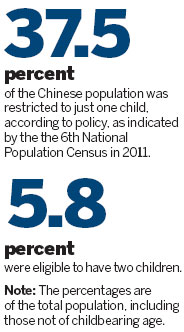Wait a minute, baby
Updated: 2013-11-17 07:02
By Shan Juan(China Daily)
|
|||||||
Family planning officials say couples eager to have a second child should wait until revised regulations are passed down to local levels
In the wake of the announcement by the Communist Party of China on Friday that the country's one-child policy will be relaxed, senior officials are asking eager parents to wait until local regulations are revised.
Wang Pei'an, vice-minister of the National Population and Family Planning Commission, issued the caution in an online news release on Saturday.
Chinese couples with one spouse being an only child would be permitted to have two children, if they choose, the CPC said on Friday, releasing policy changes that are part of deepening reforms suggested by the recently concluded Third Plenary Session of the 18th CPC Central Committee held from Nov 9 to 12.
Currently, couples in which both parents are only children can have two.
The latest adjustment to the nation's family planning laws comes after years of a strict one-child policy and is expected to affect between 15 and 20 million people on the mainland, experts estimated.

The landmark initiative was a milestone decision that reflected consultation and public opinion, and would promote a harmonious and stable society into the 21st century, said a statement issued by the National Health and Family Planning Commission on Friday evening.
It was also necessary in order to address demographic challenges, such as a rapidly aging population and a shrinking labor force, it said.
But, as Wang noted, there is no uniform timetable for the implementation of the policy nationwide, and it would be up to local authorities to decide when to put the change into effect according to local population conditions, he said.
"First we have to amend current laws on family planning before we can enforce it. People will not have to wait too long," he assured.
In areas where there is a high concentration of couples who become eligible under the new regulations, those who are older and with a ticking biological clock will get permits first, he said.
Measures are now being devised to avoid a "pile-up" of births over a short period of time, he said.
Despite the relaxation of regulations, China will still adhere to family planning as a basic long-term policy, which will be fine-tuned gradually to maintain "a balanced development of the population in China over a long run".
Lu Jiehua, a demographics professor at Peking University, said the relaxation of the one-child policy is a positive signal for further adjustments, but he felt that the impact would be limited. According to Lu, the change would affect urban areas more, given that one-child families are concentrated in the cities.
"It'll be a major step for the country to finally achieve a two-children family model," he said.
The 6th National Population Census in 2011 indicated that 37.5 percent of the Chinese population was restricted to just one child, according to policy.
Those eligible to have two children accounted for only 5.8 percent of the population.
The percentages are of total population, including people not of childbearing age.
Introduced in the late 1970s, the implementation of the one-child family planning policy has been uneven at best.
Most urban residents can have only one child, while in rural areas, couples who give birth to a girl first have been allowed to have a second child since the early 1980s. In certain areas like Qinghai and the Ningxia Hui autonomous region, families of certain ethnicities are allowed three children.
Zhai Zhenwu, director of the School of Sociology and Population Studies at the Renmin University of China, cited experts who estimate that the new changes will more likely affect urban couples of childbearing age, an estimated number of 15 to 20 million.
Among them, about 50 to 60 percent are willing to have a second child, according to a previous survey by the commission.
However, the inclination and willingness may vary from place to place, Zhai said.
"Couples in the larger cities like Beijing and Shanghai tend to want just one child while those living in small and medium-sized cities are more likely to want more," he said.
Liang Zhongtang from the Shanghai Academy of Social Sciences, however, said the latest move was not enough.
"That's just a slight adjustment to a family planning policy, which highlights government guidance - if not control - over a family issue," he pointed out.
"The ultimate goal should be eliminating limits imposed by the government, leaving the decision to the families themselves."
Mao Qun'an, a spokesman of the commission, said family planning is part of the comprehensive policy, and official estimates have ruled out the possibility of a population surge as a result of the revisions.
Yuan Xin, a professor of population studies at Nankai University, predicted the national average fertility rate would be boosted to two at most. Currently, it stands at 1.5 to 1.6 nationwide, far below the global replacement level of 2.1, official statistics show.
The fertility rate is the average number of children a woman has in her lifetime.
Mao, the commission spokesman, expected China to maintain relatively low population growth over time. He credited China's successful family planning policy with containing a potential population explosion. The country's birth rate dwindled from 33.4 per thousand in 1970 to 12.1 per thousand in 2012.
Without the policy, Mao estimated, China would have had to support a population of 1.7 to 1.8 billion, and per-capita ownership of resources, including arable land, grain, forests, drinking water and energy, would be 20 percent less than what it is today.
At that rate, resources and environmental capacity would not have been able to support rapid economic development, he said.
shanjuan@chinadaily.com.cn
(China Daily 11/17/2013 page1)